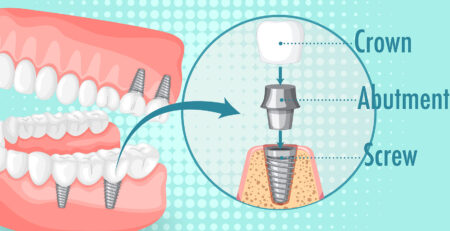Dental Implants vs. Dentures: Which Is the Right Choice for You?
When it comes to replacing missing teeth, two of the most common options are dental implants and dentures. Both solutions have their own set of advantages and disadvantages, making the choice between them a significant decision that depends on various factors, including your oral health, lifestyle, and budget.
This article delves into the differences between dental implants and dentures, helping you determine which option is the right choice for you.
Understanding Dental Implants and Dentures
What Are Dental Implants?
Dental implants are a modern and permanent solution for replacing missing teeth. They consist of three main components:
- Implant: A titanium post that is surgically placed into the jawbone, acting as a replacement for the tooth root.
- Abutment: A connector that attaches the implant to the artificial tooth or crown.
- Crown: The visible part of the implant that looks and functions like a natural tooth.
The process of getting dental implants typically involves several stages, including a consultation, implant placement surgery, healing time to allow the implant to fuse with the jawbone, and finally, the attachment of the crown.
What Are Dentures?
Dentures are removable appliances that replace missing teeth and the surrounding tissues. They come in two main types:
- Full Dentures: Replace all of the teeth in either the upper or lower jaw, or both.
- Partial Dentures: Replace some missing teeth and are supported by the remaining natural teeth and gums.
Dentures are typically made from acrylic, metal, or a combination of materials. Unlike dental implants, dentures rest on the gums and may require adhesives to stay in place.
Comparing Dental Implants and Dentures
1. Appearance and Functionality
- Dental Implants: Implants closely mimic the appearance and function of natural teeth. They are anchored securely in the jawbone, providing stability and preventing any movement while eating or speaking. Because they integrate with the bone, they help maintain the natural shape of your face and jawline.
- Dentures: Modern dentures are designed to look natural, but they may not offer the same level of realism as implants. Dentures can sometimes shift or move while eating or speaking, which can cause discomfort or embarrassment. Additionally, full dentures may slightly alter the shape of your face, especially if they are not properly fitted.
2. Comfort and Fit
- Dental Implants: Once fully healed and integrated, dental implants feel like natural teeth. They do not require any special adhesives or adjustments, and you won’t need to worry about them slipping out of place. The secure fit of implants makes them highly comfortable, with no irritation to the gums.
- Dentures: Dentures may take some time to get used to, and even after adjustment, some people find them uncomfortable, especially if they rub against the gums. Dentures can cause sore spots and may require periodic refitting as the shape of your gums and jaw changes over time. The need for adhesive creams or powders can also add to the inconvenience.
3. Durability and Longevity
- Dental Implants: With proper care, dental implants can last a lifetime. The titanium post is designed to be a permanent solution, and the crown can last 10-15 years or longer with good oral hygiene and regular dental checkups. Implants are highly durable and resistant to decay.
- Dentures: Dentures typically last 5-10 years before they need to be replaced. Over time, the shape of your jaw and gums can change, which may cause dentures to become loose or uncomfortable, necessitating adjustments or new dentures. Dentures are also more prone to wear and tear compared to implants.
4. Oral Health and Jawbone Preservation
- Dental Implants: One of the major benefits of dental implants is their ability to preserve the jawbone. When a tooth is lost, the bone in that area can begin to deteriorate due to lack of stimulation. Implants provide the necessary stimulation to prevent bone loss, maintaining the structure and strength of the jaw.
- Dentures: Dentures do not provide the same stimulation to the jawbone as implants. Over time, wearing dentures can lead to bone resorption, which may cause the jaw to shrink and alter the fit of the dentures. This can also lead to changes in facial structure and increased difficulty in keeping dentures securely in place.
5. Maintenance and Care
- Dental Implants: Implants require the same care as natural teeth—regular brushing, flossing, and routine dental checkups. There is no need for special cleaning solutions or adhesives. Because they are permanently fixed in place, implants do not require removal for cleaning.
- Dentures: Dentures require daily cleaning with a soft brush and a special denture cleanser. They must be removed at night and soaked in a cleaning solution to keep them fresh and prevent bacterial buildup. Additionally, you’ll need to clean your gums and any remaining natural teeth after removing your dentures.
6. Cost Considerations
- Dental Implants: The initial cost of dental implants is higher than that of dentures. However, because they are a long-term solution, the investment can be more cost-effective over time. The price of dental implants can vary widely depending on the number of implants needed, the complexity of the procedure, and the materials used.
- Dentures: Dentures are generally less expensive upfront compared to implants. However, the need for replacements, adjustments, and ongoing maintenance costs can add up over time. While dentures are more affordable initially, they may not offer the same long-term value as implants.
7. Procedure and Recovery Time
- Dental Implants: The process of getting dental implants involves several stages and can take several months to complete. After the implant is placed, a healing period is necessary for the bone to fuse with the implant. Once healed, the abutment and crown are attached. While the procedure is more invasive than getting dentures, the long-term benefits are significant.
- Dentures: Getting dentures is a less invasive process and can be completed in a shorter amount of time. After the initial consultation and impressions, it typically takes a few weeks to fabricate the dentures. Once ready, they are fitted and adjusted as needed. The recovery time is minimal, but some patients may need time to adjust to wearing dentures.
8. Lifestyle Considerations
- Dental Implants: Implants are ideal for those who lead an active lifestyle and want a permanent, hassle-free solution to missing teeth. They allow you to eat, speak, and smile with confidence, without worrying about the implants slipping or moving. Implants are also a great option for those who want to avoid the maintenance and care required for dentures.
- Dentures: Dentures can be a good option for those who prefer a non-surgical solution or who may not be candidates for implants due to health reasons. However, they do require more daily maintenance and may limit certain activities, such as eating tough or sticky foods. Dentures can also affect speech, particularly during the adjustment period.
Making the Right Choice: Factors to Consider
When deciding between dental implants and dentures, several factors should be considered:
- Oral Health: The condition of your gums and jawbone is crucial. Dental implants require sufficient bone density for successful placement. If you have significant bone loss, a bone graft may be necessary before getting implants. Dentures, on the other hand, do not require surgery and can be used even if the jawbone has deteriorated.
- Budget: Cost is a significant factor for many people. While dental implants are more expensive initially, they may offer better long-term value. If budget constraints are a concern, dentures may be a more affordable option, but be sure to consider the potential costs of adjustments and replacements over time.
- Lifestyle: Your daily habits and activities can influence your choice. If you want a permanent solution that requires minimal maintenance and allows you to eat and speak without restrictions, dental implants may be the better option. However, if you prefer a non-invasive procedure or have health conditions that preclude surgery, dentures could be a more suitable choice.
- Aesthetics: Both implants and dentures can improve the appearance of your smile, but implants offer a more natural look and feel. If maintaining a natural appearance and preserving facial structure is important to you, dental implants are likely the better option.
- Comfort: Consider your comfort level with each option. Dental implants, once healed, feel like natural teeth and do not require removal or adhesives. Dentures, while less invasive to obtain, may take time to get used to and can cause irritation if not properly fitted.
- Long-Term Goals: Think about your long-term goals for oral health. If you’re looking for a solution that will last for decades with proper care, dental implants are a solid investment. Dentures, while effective, may need to be replaced or adjusted more frequently.
Consulting with a Dental Professional
The best way to determine whether dental implants or dentures are right for you is to consult with a dental professional. Your dentist can evaluate your oral health, discuss your goals and preferences, and provide personalized recommendations based on your unique situation.
During your consultation, be sure to ask about:
- The specific costs associated with each option
- The expected lifespan and maintenance requirements
- The potential need for additional procedures, such as bone grafting for implants
- Any risks or complications related to each option
- How each option will impact your daily life, including eating, speaking, and oral hygiene
Your dentist will work with you to develop a treatment plan that meets your needs and fits your lifestyle.
Conclusion: Choosing the Best Option for You
Deciding between dental implants and dentures is a personal choice that depends on many factors, including your oral health, budget, lifestyle, and long-term goals.
While dental implants offer a permanent, natural-looking solution that preserves jawbone health and requires minimal maintenance, dentures provide a more affordable, non-surgical option that can be customized to fit your needs.
Ultimately, the best choice for you will depend on your individual circumstances. By understanding the differences between these two options and consulting with a dental professional, you can make an informed decision that enhances your smile and improves your quality of life.
Whether you choose dental implants or dentures, the goal is the same: to restore your smile and ensure that you enjoy the benefits of healthy, functional teeth for years to come.





Leave a Reply